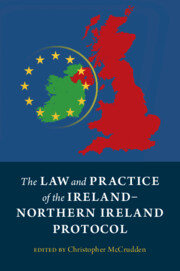Brexit is one of the most constitutionally challenging events to occur in the United Kingdom of Great Britain and Northern Ireland in a generation. The outworking of it on the small jurisdiction of Northern Ireland is potentially very significant, set against the important background of the Good Friday Agreement and its framework for peace and reconciliation in a society emerging from conflict.
The suite of primary legislative instruments comprising the European Union (Withdrawal) Act 2018, the European Union (Withdrawal Agreement) Act 2020 and the European Union (Future Relationship) Act 2020 gives effect to the range of domestic, European Union and international legal principles with which the courts of the United Kingdom have to engage.
Northern Ireland’s position was unique. It was the only part of the United Kingdom to acquire a land border with the European Union as a result of Brexit. Its framework for peace and reconciliation was underwritten by the governments of the United Kingdom and Ireland. Those factors were significant in securing an agreement on the withdrawal of the United Kingdom from the European Union with both parties signing up to a Northern Ireland Protocol to the Withdrawal Agreement.
On 31 January 2021 the Ireland–Northern Ireland Protocol to the EU–UK Withdrawal Agreement (‘the Protocol’) came into force. Its stated purpose is to set out Northern Ireland’s post-Brexit relationship with both the EU and Great Britain. Its principal intent is to maintain an open land border between Ireland and Northern Ireland.
The Protocol has been beset by difficulties – practically, politically and legally. Its very existence and many facets, some of which have been subject to examination and challenge to date, together with analysis of other parts, perhaps for the meantime less prominent, are thoroughly analysed in this book.
All of this presented considerable challenges for the Northern Ireland judiciary. The new arrangements were so wide-ranging that sensitive and difficult issues could easily arise at any tier. It was clear that a comprehensive programme of seminars and lectures was required in order to ensure that the judiciary was ready for the challenges that were likely to emerge.
Through the endeavours, primarily, of Professor Christopher McCrudden, working in close partnership with my office, particularly the Judicial Studies Board Chairman Lord Justice McCloskey, an important and informative Brexit resource for Northern Ireland has been brought into existence. Those combined efforts have produced a model for collaborative working: academics and the judiciary combining their knowledge and expertise to provide a comprehensive commentary on new and emerging issues in a difficult and complicated area of law. Between January and June 2021, the Judicial Studies Board hosted an array of informed and talented speakers, many of whom were from Queen’s University Belfast School of Law or were colleagues from other academic institutions who kindly agreed to participate, upon the invitation of Professor McCrudden.
This comprehensive discussion of the issues presented by these new arrangements is of immeasurable benefit to legal practitioners, academics, judges and wider society. On behalf of the Northern Ireland judiciary, I want to thank all of those who have contributed.

